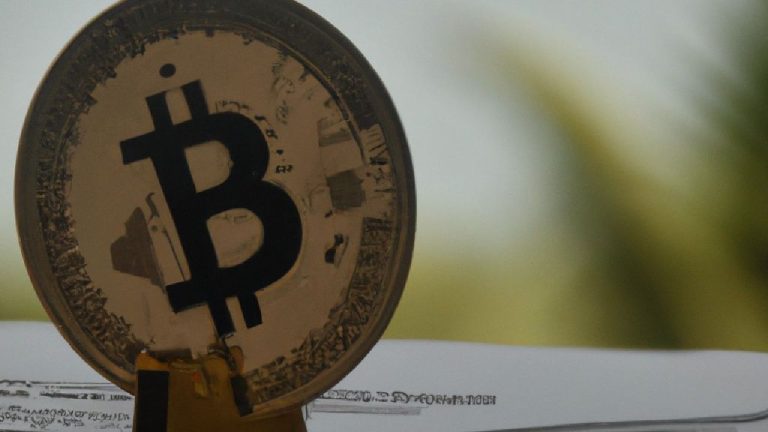 The fate of the Panamanian crypto bill project, which was approved by the Panamanian National Assembly last year, now depends on the decision of the supreme court of the country. The sanction of the project, which was vetoed by President Laurentino Cortizo, is now in the hands of the court after Congress rejected the veto […]
The fate of the Panamanian crypto bill project, which was approved by the Panamanian National Assembly last year, now depends on the decision of the supreme court of the country. The sanction of the project, which was vetoed by President Laurentino Cortizo, is now in the hands of the court after Congress rejected the veto […]
Even though this winter continues to stress test the case for Bitcoin advocation, some lawmakers strive to put their names on the crypto hot list.
Even though this winter continues to stress test the case for Bitcoin (BTC) advocation, some lawmakers strive to put their names on the crypto hot list among the likes of United States Senators Cynthia Lummis and Pat Toomey. State Senator Wendy Rogers, 68, introduced two bold bills in the Arizona legislature. One focuses on making BTC legal tender in the U.S. state. If passed into law, BTC will have the same status as the U.S. dollar, becoming an accepted medium of exchange for debt payment, public charges, taxes and dues in the state. The bill is not Rogers’ first attempt at making BTC legal tender, with a similar bill defeated in 2022.
Rogers also participated in introducing a bill that seeks to make crypto a tax-exempt property in the state. Alongside Senators Sonny Borrelli and Justine Wadsack, Rogers proposed to let Arizona residents decide on amending the state’s constitution regarding property taxes. Should the measure pass the legislature, voters could choose to make digital currencies — specifically tokens that are not “a representation of the United States dollar or a foreign currency” — tax-exempt.
Though not so bold, another important bill was introduced to the New York State Assembly. The bill would allow state agencies to accept cryptocurrency as a form of payment for fines, civil penalties, taxes, fees and other payments charged by the state. The bill does not obligate state agencies to accept crypto as payment, but it does clarify that state agencies can legally agree to accept such payments and that the courts should enforce these agreements.
Panamanian President Laurentino Cortizo sent the crypto legislation passed last year to the high court for review, claiming the so-called “crypto bill” is unenforceable and violates the constitution’s core principle. President Cortizo also argued that the bill had been approved through an inadequate procedure following his partial veto of the legislation in June 2022. At the time, the president argued that the bill needed more work to comply with new regulations recommended by the Financial Action Task Force to improve fiscal transparency and prevent money laundering.
South Korea’s Ministry of Justice has announced plans to introduce a crypto-tracking system to counter money laundering initiatives and recover funds linked to criminal activities. The “Virtual Currency Tracking System” will be used to monitor transaction history, extract information related to transactions and check the source of funds before and after the remittance. While the system is slated to be deployed in the first half of 2023, the South Korean ministry shared plans to develop an independent tracking and analysis system in the second half of the year.
The United States Securities and Exchange Commission (SEC) has been probing traditional Wall Street investment advisers that may offer digital asset custody to its clients without the proper qualifications. Much of the SEC’s efforts in this inquiry examine whether registered investment advisers have met the rules and regulations around the custody of client crypto assets. By law, investment advisory firms must be “qualified” to offer custody services to clients and comply with custodial safeguards set out in the Investment Advisers Act of 1940.

The high court will now decide whether to declare the 'crypto bill' unenforceable or to approve it with modifications.
Panama's crypto bill saga has reached a new chapter, with the country's Supreme Court deciding the future of the local crypto industry.
Panama's President Laurentino Cortizo sent on Jan. 26 the Bill No. 697, dubbed the "crypto bill," to the high court for review and approval, after objecting to the legislation, claiming it violated the constitution's core principles and was unenforceable.
The Supreme Court must now decide whether to declare the legislation unenforceable or to approve it with modifications.
According to an official statement, the government considers articles 34 and 36 of the bill unenforceable, since they violate the state's separation of powers and establish administrative structures within the government.
President Cortizo also argued that the bill had been approved through an inadequate procedure, following his partial veto of the legislation in June. At the time, the president considered the bill needed more work to comply with new regulations recommended by the Financial Action Task Force (FATF) outlining “fiscal transparency and prevention of money laundering.”
Related: The 5 most important regulatory developments for crypto in 2022
A dispute between Panama's congress and the government has centered on this bill. In April 2022, Panama lawmakers passed the legislative proposal aiming to regulate cryptocurrencies in the country, including Bitcoin. President Cortizo, however, warned a few weeks later that he wouldn’t sign itl unless it included additional Anti-Money Laundering (AML) rules.
The bill was introduced in September 2021 to the National Assembly of Panama, aiming to make the country “compatible with the digital economy, blockchain, crypto assets and the internet.” It was moved out of the Economic Affairs Committee on April 21 before being approved by the local congress.
Based on the legislation, Panamanians “may freely agree on the use of crypto assets, including without limitation Bitcoin and Ethereum” as an alternative payment for “any civil or commercial operation.”
Furthermore, the bill would regulate the tokenization of precious metals and the issuance of digital value. Digitization of identity using blockchain or distributed ledger technology would also be explored by the government’s innovation authority.

The proposal received 100% votes, establishing the DAO Foundation, the Panamanian Foundation, and the Panamanian Corporation.
The Sushi DAO, a decentralized autonomous organization behind crypto exchange SushiSwap, has approved a legal restructuring on Oct. 26 that creates three new decentralized entities, aiming to provide more flexibility to its operations.
The proposal, which received 100% votes in favor, will create the DAO Foundation, the Panamanian Foundation, and the Panamanian Corporation, each serving different purposes.
Among other things, the DAO Foundation will be able to administer treasury, grants and on-chain governance processes, and facilitate proposals and voting. The Panamanian Foundation will administer the existing Sushi protocol (including smart contracts related to the AMM/orderbook, Kashi and staking). Finally, the Panamanian Corporation will operate the GUI layer (front-end) of the protocol.
As per the preposition discussion, the process to set up the entity structure is expected to take four weeks. According to Sushi, the "purpose of the entity structure & framework is to provide maximum flexibility for Sushi to proceed in whichever direction the DAO or governance takes it, while also mitigating risk."
The move came as authorities in the United States and Union European continue to work on frameworks for regulating digital assets. Participants in the discussion forum agreed that a legal structure was necessary, but questioned the countries and the model selected. As stated in a long series of comments by a user named Daimon:
"Don’t pick countries which are constantly at risk of political collapse, financial collapse, military coups or North American bail-outs. Don’t pick countries in which you wake up one day and find presidential or royal decrees being plastered on your front door, forcing you to beat a hasty exit through the departure lounge."
On Oct. 13, John Hickenlooper, a United States Senator representing Colorado, penned a letter to Gary Gensler urging the Securities and Exchange Commission (SEC) chair to establish “clear rules” for the crypto market, including identifying the cryptocurrencies that will be considered securities, establishing registration guidelines for trading platforms, and “determining what disclosures are necessary for investors to be properly informed.”
The SEC boosted its ability to handle specialized issuer filings by adding an Office of Crypto Assets in September, dedicated solely to cryptocurrency asset applications and services.
 The President of Paraguay, Mario Abdo has issued an executive veto on a recently approved cryptocurrency bill. Abdo’s veto decree states cryptocurrency mining is an “energy-intensive” and a low-value-added activity. The bill will now be returned to Congress to be approved again or to be rejected entirely. President of Paraguay Considers Cryptocurrency Mining an Energy […]
The President of Paraguay, Mario Abdo has issued an executive veto on a recently approved cryptocurrency bill. Abdo’s veto decree states cryptocurrency mining is an “energy-intensive” and a low-value-added activity. The bill will now be returned to Congress to be approved again or to be rejected entirely. President of Paraguay Considers Cryptocurrency Mining an Energy […] The Paraguayan Senate has approved a bill that seeks to regulate cryptocurrencies and their operations in the country. The bill, which had already been submitted to the deputy chamber, was approved with some changes suggested, establishing clear definitions and tax exemptions for companies in the cryptocurrency and crypto mining sectors. Paraguayan Cryptocurrency Bill Passes Senate […]
The Paraguayan Senate has approved a bill that seeks to regulate cryptocurrencies and their operations in the country. The bill, which had already been submitted to the deputy chamber, was approved with some changes suggested, establishing clear definitions and tax exemptions for companies in the cryptocurrency and crypto mining sectors. Paraguayan Cryptocurrency Bill Passes Senate […]
American platform became the first one to freeze the withdrawal operations, but might not be the last
Last week, the Celsius Network wrote its name in the alarming recent history of the crypto market failures alongside Terra. The American platform has unstaked $247 million worth of Wrapped Bitcoin (wBTC) from the Aave protocol and sent it to crypto exchange FTX while putting the withdrawal option for users on a stop.
Immediately after that, United States securities regulators from five states — Alabama, Kentucky, New Jersey, Texas and Washington — opened an investigation into Celsius. This isn’t the first time the platform is facing suspicions from law enforcement. In September 2021, The Texas State Securities Board scheduled a hearing related to allegations that the network had offered and sold securities in the state that were not registered or permitted.
What is worrying, though, is that Celsius might not appear as a single case of poor management but the first victim in a row amid the ongoing liquidity crisis in crypto. By the end of the week, Hong Kong-based asset manager Babel Finance announced the temporary suspension of redemptions and withdrawals from its products, citing “unusual liquidity pressures.”
United States Securities and Exchange Commission (SEC) Chair Gary Gensler admitted that he’s worried, and the object of his anxiety is the recently published “Responsible Financial Innovation Act,” co-sponsored by Senators Cynthia Lummis and Kirsten Gillibrand. Speaking at The Wall Street Journal’s CFO Network Summit, Gensler implied the bill has the potential to “undermine the protections we have in a $100 trillion capital market.”
Sometimes months or even years of optimistic development can just stop at one moment. It happened in Panama, as the country’s president Laurentino Cortizo has partially vetoed Bill No. 697. A “crypto bill” passed the National Assembly voting in April 2022, but Cortizo was pretty clear even at that point, threatening to veto the document unless it included additional Anti-Money Laundering (AML) rules. Should the bill finally receive the president’s signature, it would make Panama the second Central American country to regulate the spending of cryptocurrencies.
Billionaire Elon Musk has been used for $258 billion on the allegations of being “engaged in a crypto pyramid scheme” involving Dogecoin (DOGE): a number that might be a bit audacious, as it exceeds Dogecoin’s all-time high market cap by three times. In the filing, one of the plaintiffs states that Musk and his corporations were “unjustly enriched” by $86 billion as a result of wire fraud, gambling enterprise, false advertising, deceptive practices and other unlawful conduct. The case could certainly color up the media space.
 Laurentino Cortizo, president of Panama, has exercised his veto powers to make a series of objections to the recently approved cryptocurrency law. The observations of the president only touch on certain articles and do not affect the law in its entire scope. However, these articles of the bill will have to be re-discussed, taking into […]
Laurentino Cortizo, president of Panama, has exercised his veto powers to make a series of objections to the recently approved cryptocurrency law. The observations of the president only touch on certain articles and do not affect the law in its entire scope. However, these articles of the bill will have to be re-discussed, taking into […]
Although the President has previously called the laws innovative, his concern regarding anti-money laundering measures has put the bill back up for debate with the government.
Panama’s President Laurentino Cortizo has partially vetoed Bill No. 697 dubbed the “crypto bill” saying it requires more work to better fit Panama’s financial regulations.
President Cortizo previously warned in May he wouldn’t sign the bill unless it included additional Anti-Money Laundering rules after Panama’s National Assembly passed the crypto bill in late April 2022.
Local media outlet La Prenda obtained a copy of the 32-page veto, reporting the President wrote it's “imperative” the cryptocurrency laws conform to new regulations recommended by the Financial Action Task Force (FATF) outlining “fiscal transparency and prevention of money laundering”.
President Cortizo has previously described the legislation as an “innovative law”, and indicated approval of certain aspects of the bill, but has said possible illicit uses of cryptocurrencies needed addressing.
Congressman Gabriel Silva who helped introduce the bill in September 2021 tweeted on June 16 that (according to a translation) the veto was “a lost opportunity to generate jobs, attract investment and incorporate technology and innovation in the public sector.”
El Presidente acaba de vetar parcialmente el proyecto de Ley de Crypto
— Gabriel Silva (@gabrielsilva8_7) June 16, 2022
Una oportunidad perdida para generar empleos, atrae inversión e incorporar tecnología e innovación en el sector público
El país merece más oportunidades y también inclusión financiera (1/2)
“The country deserves more opportunities and financial inclusion,” Silva added, saying Congress will study the veto to make corrections which will then be passed through to debates.
Related: Top 30 Panama Bank is ‘Bitcoin friendly,’ welcomes crypto services
If the bill is eventually signed it will make Panama the second Central American country to regulate the spending of cryptocurrencies. The nearby country of El Salvador was famously the first country to make Bitcoin (BTC) a legal tender.
Unlike El Salvador however, Panama’s bill covers other cryptocurrencies besides Bitcoin and wouldn’t require local businesses to accept digital assets.
According to the bill Panamanians “may freely agree on the use of crypto assets, including without limitation Bitcoin and Ethereum (ETH)” as an alternative payment for “any civil or commercial operation”.
The bill would also cover the issuance of digital value and regulate the tokenization of such things as precious metals. A digitization of identity using blockchain or distributed ledger technology would also be researched by the government’s innovation authority.